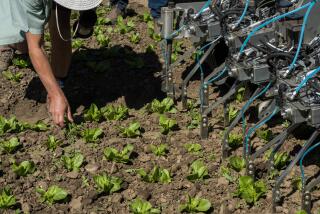Bioengineered Foods Appear Ready to Soar
- Share via
Strictly by the numbers, it would seem that Californians love tomatoes.
California farmers grow 20.6 billion pounds a year. Millions are eaten here--about 135 fresh tomatoes a year for every man, woman and child.
But perhaps the number that counts most, especially for biotechnology companies designing new tomato varieties, comes from an old grocers’ joke: For every tomato eaten, there are three complaints about how the tomatoes taste.
Several companies are poised to cash in on the hunger for a good-tasting tomato and the state’s nearly $1-billion market. Now, they will have smoother sailing to the marketplace.
On Tuesday, as expected, the federal government announced that fruits, vegetables and grains that have been created by biotechnology will be treated by the Food and Drug Administration just like other foods. In many cases, that means that genetic engineering companies won’t have to seek prior FDA approval before selling new food products.
Within a year, two companies hope to have their new tomato varieties available to consumers and processors. In the future, consumers could be buying genetically engineered potatoes, peppers and soybeans.
The meat and poultry they serve could come from animals that have been fed on genetically engineered grain. Before the turn of the century, consumers could be buying specialty oils and starches from genetically engineered crops.
Calgene, of Davis, Calif., is calling its new tomato the FlavrSavr. It says it will begin selling it when it has enough seeds--at least by the last half of 1993.
Its tomato has been designed to be meatier and to stay fresh longer, using Calgene’s antisense technology. In that method, a copy of one of the plant’s genes is cloned and reinserted in reverse order, binding to its “opposite” gene and nullifying it. In the case of the tomato, the gene that tells the tomato to start rotting has been “turned off” by the inserted gene.
DNA Plant Technology, a New Jersey-based company with Oakland laboratories, said it will have its first new tomato ready about the same time. It was developed through somaclonal variation, rather than internal genetic manipulation.
In somaclonal variation, cells from the plant’s root or stem are regenerated into entire plants. These “forced” plants are selected for desirable characteristics, then reproduced through traditional breeding. DNAP, as the company is called, says its tomato will also taste better and have a longer shelf life.
Calgene, agriculture giant Monsanto and DNAP are also working with other genetic engineering techniques to improve the tomato’s taste, meatiness and longevity.
Other plants under development--and covered by the new FDA policy--include:
* Potatoes: Monsanto is developing a potato with a built-in resistance to pests. Another of Monsanto’s potato varieties, aimed at health-conscious consumers, would have more “meat” and less water. During frying and other oil-intensive processing (making french fries and chips), the potato would absorb less grease.
* Cotton: Calgene and Monsanto are among those working to develop cotton that has a built-in resistance to herbicides. The companies say this means that farmers would be able to use safer weed-killing chemicals. Cotton seeds are used in some cooking oils; cotton seed meal is fed to livestock. Monsanto is also developing herbicide-resistant soybeans and rapeseed.
* Canola oil: Canola, a product of the rapeseed plant, already has a low level of saturated fat. Among several canola projects, Calgene is looking to further reduce saturated-fat levels, enable canola oil to be used as a substitute for cocoa butter (used in making chocolates) and develop a plant that will make its own margarine.
DNAP is also developing a canola oil with lower saturated fats. This project uses the company’s “transswitch” technology--also used in one of DNAP’s tomato projects. In transswitching, a gene that causes an undesirable trait is doubled--shutting off the gene.
* Corn: Biotechnica of Kansas City, Kan., is going up against the major corn-seed companies, DeKalb and Pioneer, in an attempt to engineer new corn varieties. These include corn with higher levels of protein for animal feed, corn-derived oils and starches--and even, many say, fully biodegradable plastics.
More to Read
Eat your way across L.A.
Get our weekly Tasting Notes newsletter for reviews, news and more.
You may occasionally receive promotional content from the Los Angeles Times.










